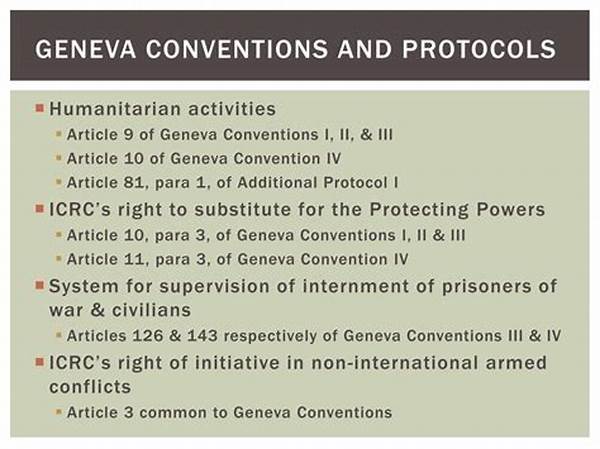The Geneva Convention protocols represent a cornerstone in international humanitarian law, established to outline the humane treatment of individuals during war. Their enforcement, however, presents both a legal and moral imperative that necessitates rigorous evaluation and action by state and non-state actors alike. This article explores the multifaceted challenges and responsibilities surrounding the enforcement of these protocols.
Challenges in Enforcement
The enforcement of Geneva Convention protocols is fraught with numerous challenges, primarily due to the complexity of modern warfare and the geopolitical landscape. Conflicts today often involve non-state actors, making the application of these protocols more complicated. Furthermore, differing interpretations of the conventions and a lack of a centralized enforcement body compound these issues. Without stringent monitoring and accountability mechanisms, violations can occur with little repercussion. It is, therefore, essential to develop a robust international framework to address these enforcement gaps. The pursuit of accountability for breaches and the promotion of adherence to these protocols must remain a priority for the international community.
The Role of International Institutions
1. International Criminal Court (ICC): The ICC plays a pivotal role in ensuring enforcement of Geneva Convention protocols by prosecuting individuals for war crimes.
2. United Nations (UN): The UN facilitates diplomatic efforts to ensure compliance and offers platforms for countries to address violations.
3. International Committee of the Red Cross (ICRC): As a guardian of humanitarian law, the ICRC monitors compliance and provides humanitarian assistance where needed.
4. Individual States: Countries are responsible for integrating Geneva Convention protocols into national legislation and prosecuting violators within their jurisdiction.
5. Non-Governmental Organizations: NGOs play an essential part in advocacy and monitoring violations, drawing international attention to enforcement lapses.
Legal Mechanisms for Compliance
The enforcement of Geneva Convention protocols necessitates robust legal mechanisms to ensure compliance and accountability. Firstly, countries must incorporate these protocols into national legislation, making violations punishable under local law. This step ensures that individuals responsible for breaches can be prosecuted and held accountable. Secondly, international courts, such as the International Criminal Court, provide a crucial platform to address violations that transcend national boundaries, ensuring that perpetrators are not shielded by political influences. These legal structures foster an environment where human rights and war laws are respected, thereby enhancing global justice and peace. As such, the legal community must continue advocating for these measures and ensure their effective implementation.
Strengthening Compliance Through Education
Educating military personnel and policymakers on the importance of the enforcement of Geneva Convention protocols is vital for strengthening compliance. Comprehensive training programs and workshops are essential, enabling individuals to understand the ethical and legal implications of their actions in conflict situations. Furthermore, promoting awareness campaigns within societies can foster a culture that respects international humanitarian law and denounces violations. By embedding these principles into military and civilian education systems, future generations will be better equipped to uphold and advocate for these protocols, ultimately contributing to global peace and security.
The Importance of International Cooperation
International cooperation is paramount in the enforcement of Geneva Convention protocols. Only through collaborative efforts can the international community address violations effectively. States must work together to share intelligence and best practices, standardizing enforcement measures across borders. Furthermore, global forums should be leveraged to hold accountable those who breach humanitarian laws, ensuring justice is served. This cooperation not only facilitates enforcement but also reinforces the notion that adherence to these protocols is a collective responsibility. Robust partnerships among nations, international organizations, and civil society are essential for fostering a world where these conventions are universally respected.
Monitoring and Reporting Mechanisms
Reliable monitoring and reporting mechanisms are essential for the effective enforcement of Geneva Convention protocols. By establishing independent bodies to oversee conflicts and assess adherence to these protocols, the international community can ensure transparency and accountability. Regular reports and documentation of violations should be made publicly available, serving as both a deterrent and a tool for advocacy. Furthermore, encouraging whistleblowing in military and civilian structures can uncover otherwise concealed infractions. Strengthening these mechanisms is imperative for enforcing compliance and safeguarding the rights and dignity of individuals affected by conflict.
Summary
The enforcement of Geneva Convention protocols is a complex yet crucial task that requires the concerted efforts of both state and non-state actors. The diverse challenges presented by modern warfare necessitate adaptive strategies and robust legal frameworks to address violations. International cooperation stands as a cornerstone for successful enforcement, enabling countries to work collectively in sharing intelligence, resources, and best practices. Moreover, education and awareness-raising initiatives play a vital role in embedding a culture of respect for these protocols within societies and institutions. Through diligent monitoring, reporting, and prosecution of violations, these conventions can achieve their ultimate purpose: protecting human dignity in times of war.
In conclusion, the global commitment to enforcing Geneva Convention protocols is a testament to mankind’s resolve to uphold justice and peace in tumultuous times. With relentless advocacy and enduring cooperation, the international community can reinforce the structures necessary to ensure these protocols are not merely ideals but enforceable realities. Thus, nations must continue to collaborate, educate, and legislate to actualize the principles enshrined in these conventions, safeguarding future generations from the atrocities of unchecked conflict.





